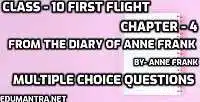
[quiz-cat id=”66812″]
From the Diary of Anne Frank
By– Anne Frank
MULTIPLE CHOICE QUESTIONS
1.Anne Frank is___________ old.
(A) 10 years (B) 11 years
(C) 12 years (D) 13 years
2. What does Anne decide?
(A) writing a diary (B) making friends
(C) not to write a diary (D) not to make any friend
3. Who helped Anne to write the essay in verse?
(A) Shiny (B) Sanne
(C) Sandra (D) Sony
4. Flow many real sisters did Anne have?
(A) one (B) two
(C) three (D) none
5. Anne had everything on this earth; except
(A) a friend (B) loving parents
(C) a true friend (D) a loving sister
6. What name does Anne give to her Diary?
(A) Margot (B) Same
(C) Kitty (D) Edith
7. Find out the name of Anne’s elder sister.
(A) Margot (B) Sanne
(C) Kitty (D) Edith
8. Anne was born in Frankfurt in Germany when she was four, her father emigrated to
(A) France (B) Holland
(C) England (D) Belgium
9. When was Anne born?
(A) in 1929 (B) in 1933
(C) in 1934 (D) in 1935
10. Who was Mrs Kuperus?
(A) Anne’s mother (B) Anne ‘s Neighbour
(C) Anne’s friend (D) Anne’s teacher in the sixth form
Answers:-
| 1.(D) 13 years |
| 2.(A) writing a diary |
| 3.(B) Sanne |
| 4.(A) one |
| 5.(C) a true friend |
| 6.(C) Kitty |
| 7.(A) Margot |
| 8.(B) Holland |
| 9.(A) in 1929 |
| 10.(D) Anne’s teacher in the sixth form |
From the Diary of Anne Frank- Multiple Choice Questions in Quiz Part-2
From the Diary of Anne Frank- Multiple Choice Questions in Quiz Part-3
From the Diary of Anne Frank- Multiple Choice Questions in Quiz Part-4
From the Diary of Anne Frank- Multiple Choice Questions in Quiz Part-5
From the Diary of Anne Frank- Multiple Choice Questions in Quiz Part-6
Want to Read More Check Below:-

From the Diary of Anne Frank- About the Author & Introduction
From the Diary of Anne Frank- Line To Line Explanation in Hindi
From the Diary of Anne Frank- Important Extra Questions- Very Short Answer Type